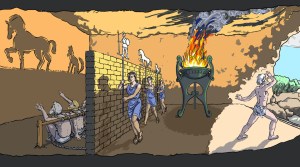We support our Publishers and Content Creators. You can view this story on their website by CLICKING HERE.
Plato wrote his Allegory of the Cave about the journey from ignorance to true philosophy, but I think his allegory fits another journey even better: the journey of the Christian life.
 Plato tells a curious story in his Republic. It goes like this: Many people are chained up, head to toe, in the deepest, darkest part of an enormous cave. They have been there since infancy and are bound so completely that they can’t even turn their heads side to side to see the others fastened beside them. Their whole world is made up of two things: the shadows that pass to and fro across the cave’s wall and the noises that seem to come from those shadows. The prisoners believe these images are the real world, when in fact they’re the invention of their captors, who move puppets in front of a fire to make the shadows. Although the sorry souls are deceived and confused, Plato says they’re so mesmerized by the show in front of them that they’re actually unaware of living in a false world. It’s a picture of a truly tragic existence.
Plato tells a curious story in his Republic. It goes like this: Many people are chained up, head to toe, in the deepest, darkest part of an enormous cave. They have been there since infancy and are bound so completely that they can’t even turn their heads side to side to see the others fastened beside them. Their whole world is made up of two things: the shadows that pass to and fro across the cave’s wall and the noises that seem to come from those shadows. The prisoners believe these images are the real world, when in fact they’re the invention of their captors, who move puppets in front of a fire to make the shadows. Although the sorry souls are deceived and confused, Plato says they’re so mesmerized by the show in front of them that they’re actually unaware of living in a false world. It’s a picture of a truly tragic existence.
Now, Plato asks what would happen if a man were freed from the cave and brought to the world above. This experience, he points out, would be discomfort all the way through. The fire hurts his eyes, his limbs are sore, and, as his eyes adjust to the fire and the increasing light near the surface, he no longer sees the shadows while still being unable to see the new world in front of him. But very slowly, as his eyes adjust more, he begins to see wonderful shapes and colors more vibrant than anything he had ever imagined. He finally knows the real world, even better than his dreams.
Plato wrote this allegory about the journey from ignorance to true philosophy, but I think his allegory fits another journey even better: the journey of the Christian life.
Before Christ entered our lives, we lived in darkness. Our bodies were bound from head to toe, bound by sin through our attachments and addictions. The greatest bondage of all was in our minds, deceived constantly by our own sinful desires and by our captor, the devil. We misunderstood ourselves, our neighbors, the world around us, and God; because of original sin, we were born this way. Most pitifully of all, we didn’t even know that we lived in a world of falsehood.
When Christ enters, he shatters the fetters with his strong arm. He lifts us and supports our sore limbs. Most importantly, he shows us the truth, putting to flight the darkness that surrounds us. He leads us out into the sunlight, walking with us as we stumble. And if we are patient, letting our eyes adjust, we begin to see. First, we see things that look familiar—ourselves, our families, our friends—but they finally fit together into a single, coherent, lovely plan. We see their ultimate purpose for the first time. But then, we notice a world that we didn’t know existed or even expect: the world of grace. We begin to understand, through the light of faith poured into our minds, supernatural things like Scripture, the Eucharist, and the Church.
This has already happened to you and to me. At baptism, Jesus poured his Holy Spirit upon us, elevating our reason and giving us the new light of faith as well. With these gifts, we began to see the world in the light of God, and since God is the Creator and the Goal of all creation, seeing him makes everything else intelligible.
As attractive as it might sound, many of us probably don’t see ourselves in this description. Why is this? Because we often choose to re-enter the cave. As we wait for our eyes to adjust fully, we let our impatience get the better of us, and we leave the beauty of the daylight for the familiarity of the darkness. Yet, as many times as we descend, Christ descends too, hot on our trail. He stands beside us as we return to our position watching the shadows, and he whispers his word of Truth once again. “If you come with me, I will show you wonders. Will you let me?”
✠
Republished with gracious permission from Dominicana (September 2024).
The Imaginative Conservative applies the principle of appreciation to the discussion of culture and politics—we approach dialogue with magnanimity rather than with mere civility. Will you help us remain a refreshing oasis in the increasingly contentious arena of modern discourse? Please consider donating now.
Image: An Illustration of The Allegory of the Cave (creative commons)
Share This Story, Choose Your Platform!
Go to Top

 Conservative
Conservative  Search
Search Trending
Trending Current News
Current News 






